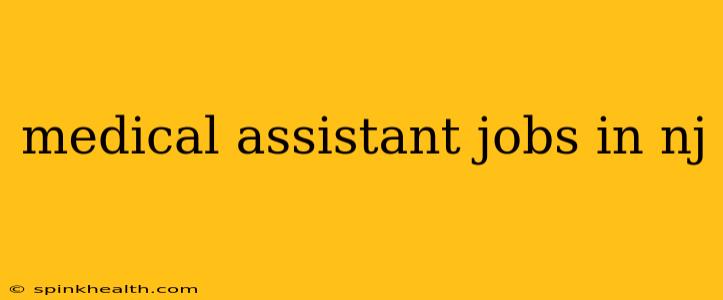The bustling healthcare landscape of New Jersey offers a wealth of opportunities for aspiring medical assistants. If you're looking to launch or advance your career in this rewarding field, this guide is your compass. We'll navigate the specifics of finding medical assistant jobs in NJ, addressing common questions and offering expert advice to help you succeed.
What are the typical duties of a Medical Assistant in NJ?
The daily life of a medical assistant in NJ, like anywhere else, is a blend of administrative and clinical tasks. Imagine a typical day: you might start by greeting patients, verifying insurance information, and updating medical records. Then, you'll transition into assisting the physician, taking vital signs, preparing examination rooms, and even assisting with minor procedures. You're the essential link between the doctor and the patient, ensuring a smooth and efficient workflow. This role requires a mix of compassion, technical skill, and organizational prowess.
What are the educational requirements for a Medical Assistant in NJ?
Many pathways lead to becoming a medical assistant in NJ. Some employers prefer candidates with a formal certification from an accredited program, usually a diploma or associate's degree. These programs provide comprehensive training in both administrative and clinical skills, preparing you for the realities of the job. However, on-the-job training is also a viable route for some, especially those with relevant experience in healthcare or administrative fields. Regardless of your chosen path, continuing education is vital for staying updated on the latest medical advancements and technologies.
What salary can I expect as a Medical Assistant in NJ?
The salary of a medical assistant in NJ depends on several factors: experience, location, employer, and certification. Generally, you can expect a competitive salary, reflecting the high demand for qualified professionals in the state. While entry-level positions might offer a lower starting point, salaries can significantly increase with experience and additional certifications. Researching salary data from reputable sources, like the Bureau of Labor Statistics, can provide a more precise estimate based on your specific situation.
What certifications are available for Medical Assistants in NJ?
Several certifications can boost your credentials and career prospects as a medical assistant in NJ. The most sought-after is the Certified Medical Assistant (CMA) credential, offered by the American Association of Medical Assistants (AAMA). Other organizations offer similar certifications. These certifications demonstrate your competency and commitment to the profession, making you a more attractive candidate to potential employers.
What are the job prospects for Medical Assistants in NJ?
The job market for medical assistants in NJ is robust and is expected to remain strong for the foreseeable future. The aging population and increasing demand for healthcare services contribute significantly to this positive outlook. With the right qualifications and experience, you should find ample opportunities throughout the state, in various settings from private practices to hospitals and clinics.
How do I find Medical Assistant jobs in NJ?
Finding your ideal medical assistant job in NJ involves a multi-pronged approach. Start by leveraging online job boards like Indeed, Monster, and LinkedIn. Network with healthcare professionals, attend career fairs, and connect with recruiters specializing in the medical field. Don't underestimate the power of directly contacting healthcare facilities in your area – a targeted approach can often yield promising results. Tailoring your resume and cover letter to each specific job application will also significantly increase your chances of securing an interview.
Embarking on your journey to becoming a medical assistant in NJ is an exciting step towards a fulfilling career. Remember to focus on building your skills, gaining relevant experience, and actively pursuing opportunities. With dedication and the right strategy, you'll be well-equipped to thrive in this essential healthcare role.

